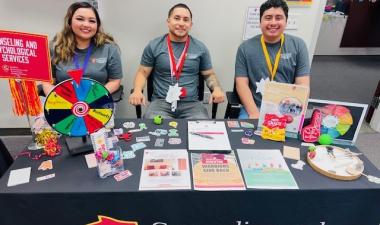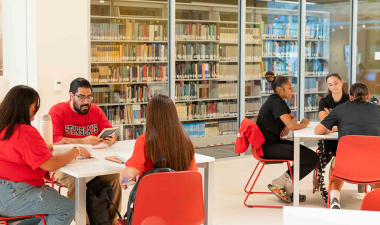With the COVID-19 pandemic continuing worldwide, it’s only natural for campus community members to feel varying emotions about returning to campus this fall.
Professionals in Stanislaus State’s Psychological Counseling Services (PCS) and Health Education and Promotion (HEP) departments know this well. For the past 18 months, they have been helping Warriors work through anxiety, depression and other mental health issues caused or exacerbated by the pandemic. Now, they are preparing to help people deal with their feelings and concerns as the University reopens.
“The issues that counselors have been seeing are caused by anxiety about the unknown. Students don’t know what to expect,” said Jennifer Staffero, a licensed clinical social worker in PCS. “There are some students who are ready to be all in-person this fall but most are very cautious.”
They are cautious for good reasons, said Megan Rowe, a health education coordinator in HEP. A survey given last spring to Stan State and other college students nationwide revealed:
- 91 percent were feeling stress caused by the virus;
- 81 percent were concerned about not seeing a loved one;
- 34 percent knew someone dealing with the long-term effects of COVID-19; and
- 27 percent lost a close family member or friend to the virus.
To help individuals deal with the pandemic’s uncertainty while they manage the transition back to face-to-face instruction and in-person operations, PCS is offering a series of six workshops on topics that include managing anxiety, practicing self-compassion and depression recovery through art. The PCS webpage offers a trove of information, including tips for coping with the pandemic and links to TAO (Therapy Assistance Online) and crisis resources.
HEP also offers a webpage full of resources to help students with stress management, sleep, mindful self-compassion and other health topics. The Employee Assistance Program is available support faculty and staff and is accessible from the Human Resources website.
Here are some tips to help anyone cope during the transition:
- To manage anxiety about reopening, step back, pause and give yourself permission to take it as slowly as you like. Stay up to date on the latest requirements and guidance regarding safety measures and remember that it is OK for you and others to take additional precautions if they give you comfort.
- Practice self-compassion and accept that emotions are OK and natural reactions. You may find guided meditation programs to be helpful. There are plenty of free videos posted on YouTube.
- Recognize the symptoms of stress. That may include anxiety, feeling powerless, low motivation, feeling tired or burned out, sadness and poor concentration. Don’t feel timid about reaching out for the help you need to manage stress or other emotions.
- Try to maintain a regular schedule as much as possible. Start each day with a plan to do a few things. It might help to keep a daily journal about how you are feeling and what you are doing. Staying busy, having a routine and tracking it will help you feel better and increase your sense of control.
- Stay informed about the COVID-19 virus and the latest health information by relying on trusted, accurate news and information sources. Don’t watch too much news or read too many articles if it becomes overwhelming. Instead, set reasonable limits for yourself and stick to your plan.
- Take time to get some exercise at a level you are comfortable with. Walk or bike in your neighborhood, workout to videos, try yoga through an online program or visit your gym if it is open and you feel comfortable there. Moving your body will get your blood flowing and improve your mental outlook.
- Stay in touch with family and friends. If being face-to-face concerns you, consider visiting with them outdoors or wear a face covering. At the very least, stay connected with telephone calls, emails, text messages, FaceTime or a similar app. Don’t talk too much about the pandemic. Instead, share a few laughs and keep the conversation upbeat.
- Get a dose of nature. Nature has tremendous calming and healing powers. Visit a park or take a long stroll through the beautiful Stan State campus when it reopens. Take in the sound of birds chirping and the smell of fresh foliage.
- Tap into your creative side. Expressing yourself through painting, music, dancing or other art forms can be very therapeutic.



